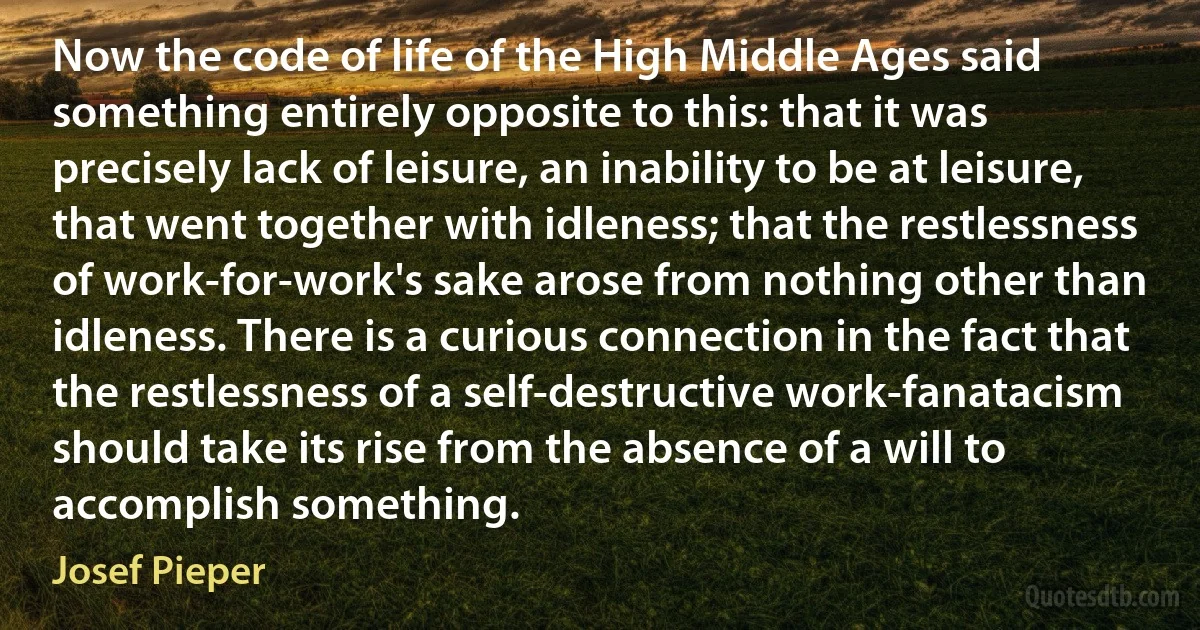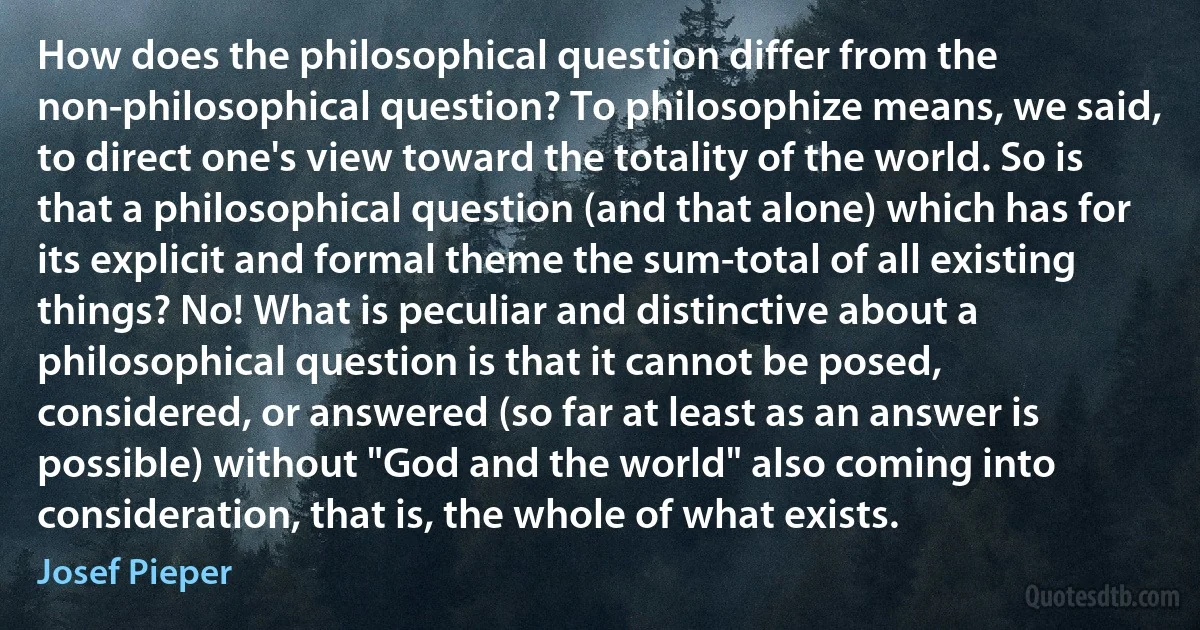Josef Pieper quotes
Leisure lives on affirmation. It [...] includes within itself a celebratory, approving, lingering gaze of the inner eye on the reality of creation.
The highest form of affirmation is the festival; and according to Karl Kerenyi, the historian of religion, to festival belong "peace, intensity of life, and contemplation all at once." The holding of a festival means: an affirmation of the basic meaning of the world, and an agreement with it, and in fact it means to live out and fulfil one's inclusion in the world, in an extraordinary manner, different from the everyday.
The festival is the origin of leisure, its inmost and ever-central source. And this festive character is what makes leisure not only "effortless" but the very opposite of effort or toil.

Josef Pieper
To the virtue of temperance as the preserving and defending realization of man's inner order, the gift of beauty is particularly co-ordinated. Not only is temperance beautiful in itself, it also renders men beautiful. Beauty, however, must here be understood in its original meaning: as the glow of the true and the good irradiating from every ordered state of being, and not in the patent significance of immediate sensual appeal. The beauty of temperance has a more spiritual, more austere, more virile aspect. It is of the essence of this beauty that it does not conflict with true virility, but rather has an affinity to it. Temperance, as the wellspring and premise of fortitude, is the virtue of mature manliness.
The infantile disorder of intemperance, on the other hand, not only destroys beauty, it also makes man cowardly; intemperance more than any other thing renders man unable and unwilling to 'take heart' against the wounding power of evil in the world.

Josef Pieper
We can begin, like the Scholastic masters, with an objection: videtur quod non ... ""It seems not to be true that..."" And this is the objection: a time like the present [i. e., a few years after the Second World War, in Germany] seems, of all times, not to be a time to speak of leisure. [...]
That is no small objection. But there is also a good answer to it. [...]
For, when we consider the foundations of Western European culture (is it, perhaps, too rash to assume that our re-building will in fact be carried out in a ""Western"" spirit? Indeed, this and no other is the very assumption that is at issue today), one of these foundations is leisure. We can read it in the first chapter of Aristotle's Metaphysics. And the very history of the meaning of the word bears a similar message. The Greek word for leisure (σχολή) is the origin of Latin scola, German Schule, English school. The names for the institutions of education and learning mean ""leisure.""

Josef Pieper
If someone needs the "unusual" to be moved to astonishment, that person has lost the ability to respond rightly to the wondrous, the mirandum, of being. The hunger for the sensational, posing, as it may, in "bohemian garb," is an unmistakable sign of the loss of the true power of wonder, for a bourgeois-ized humanity.

Josef Pieper
To experience and live out a harmony with the world, in a manner quite different from that of everyday life - this, we have said, is the meaning of "festival." But no more intense harmony with the world can be thought of than that of "Praise of God," the worship of the Creator of this world. Now, as I have often experienced, this statement is often received with a mixture of discomfort and various other feelings, but its truth cannot be denied. The most festive festival that can be celebrated is religious worship or "cult," and there is no festival that does not get its life from such worship or does not actually derive its origin from this. There is no worship "without the gods," whether it be mardi gras or a wedding.

Josef Pieper
Let us now pose the question again: is recourse to the "human" really enough to preserve and firmly ground the reality of leisure? I intend to show that such recourse to mere Humanism is not enough.
It could be said that the heart of leisure consists in "festival." In festival, or celebration, all three conceptual elements come together as one: the relaxation, the effortlessness, the ascendancy of "being at leisure" [...] over mere function.

Josef Pieper
In leisure - not only there, but certainly there, if anywhere - the truly human is rescued and preserved precisely because the area of the "just human" is left behind over and over again - and this is not brought about through the application of extreme efforts but rather as with a kind of "moving away" (and this "moving" is of course more difficult than the extreme, active effort; it is "more difficult" because it is less at one's own disposal; the condition of utmost exertion is more easily to be realized than the condition of relaxation and detachment, even though the latter is effortless: this is the paradox that reigns over the attainment of leisure, which is at once a human and superhuman condition). As Aristotle said of it: "man cannot live this way insofar as he is man, but only insofar as something divine dwells in him."

Josef Pieper
Within the world of total work, the "festival" is either "a break from work" (and thus only there for the sake of work), or it is a more intensive celebration of the principles of work itself (as in the "Labor Days," and thus belongs, again, to the working world). There will naturally be "games" - like the Roman circences - but who would dignify the amusements for the masses with the name of "festival"?

Josef Pieper
Against the exclusiveness of the paradigm of work as activity, first of all, there is leisure as "non-activity" - an inner absence of preoccupation, a calm, an ability to let things go, to be quiet.
Leisure is a form of that stillness that is the necessary preparation for accepting reality; only the person who is still can hear, and whoever is not still, cannot hear. [...] Leisure is the disposition of receptive understanding, of contemplative beholding, and immersion - in the real.

Josef Pieper
It could even be said, perhaps, that this very opposition, this threat from the world of total work, is what characterizes the situation of philosophy today more than its own particular content. Philosophy increasingly adopts - necessarily, it seems - the character of the alien, of mere intellectual luxury, of that which seems ever more intolerable and unjustifiable, the more exclusively the demands of the daily world of work take over the world of man.

Josef Pieper
And as for the close connection between philosophy and poetry, we can refer to a little-known statement by Thomas Aquinas in his Commentary on Aristotle's Metaphysics [I, 3]: the Philosopher is akin to the Poet in this, that both are concerned with the mirandum, the "wondrous," the astonishing, or whatever calls for astonishment or wonder. This statement is not that easy to fathom, since Thomas, like Aristotle, was a very sober thinker, completely opposed to any Romantic confusion of properly distinct realms. But on the basis of their common orientation towards the "wonderful" (the mirandum - something not to be found in the world of work!) - on this basis, then, of this common transcending-power, the philosophical act is related to the "wonderful," is in fact more closely related to it than to the exact, special sciences; to this point we shall return.

Josef Pieper
"The essence of happiness consists in an act of the intellect.” (Thomas Aquinas, Summa Theologica) ... What is implicit in this sentence? This is implicit: the fulfillment of existence takes place in the manner in which we become aware of reality; the whole energy of our being is ultimately directed toward attainment of insight. The perfectly happy person, the one whose thirst has been finally quenched, who has attained beatitude-this person is the one who sees. The happiness, the quenching, the perfection, consists in this seeing.

Josef Pieper
"None of the gods philosophizes," Plato has Diotima say in the Symposium [204]: "nor do fools; for that is what is so bad about ignorance - that you think you know enough." "Who, then, O Diotima, I asked, are the philosophers, since they are neither those who know nor those who don't know?" Then she answered me: "It's so obvious, Socrates, that a child could understand: the philosophers are the ones in between." This "in-between" is the realm of the truly human. It is truly human, on the one hand, not to understand (as God), and on the other hand, not to become hardened; not to include oneself in the supposedly completely illuminated world of day-to-day life.

Josef Pieper


![Not only the Greeks in general - Aristotle no less than Plato - but the great medieval thinkers as well, all held that there was an element of purely receptive "looking," not only in self-perception but also in intellectual knowing or, as Heraclitus said, "Listening-in to the being of things."
The medievals distinguished between the intellect as ratio and the intellect as intellectus. Ratio is the power of discursive thought, of searching and re-searching, abstracting, refining, and concluding [cf. Latin dis-currere, "to run to and fro"], whereas intellectus refers to the ability of "simply looking" (simplex intuitus), to which the truth presents itself as a landscape presents itself to the eye. (Josef Pieper)](https://cdn.quotesdtb.com/img/quotes_images_webp/47/josef-pieper-ability-concluding-311947.webp)
